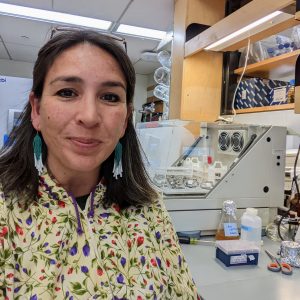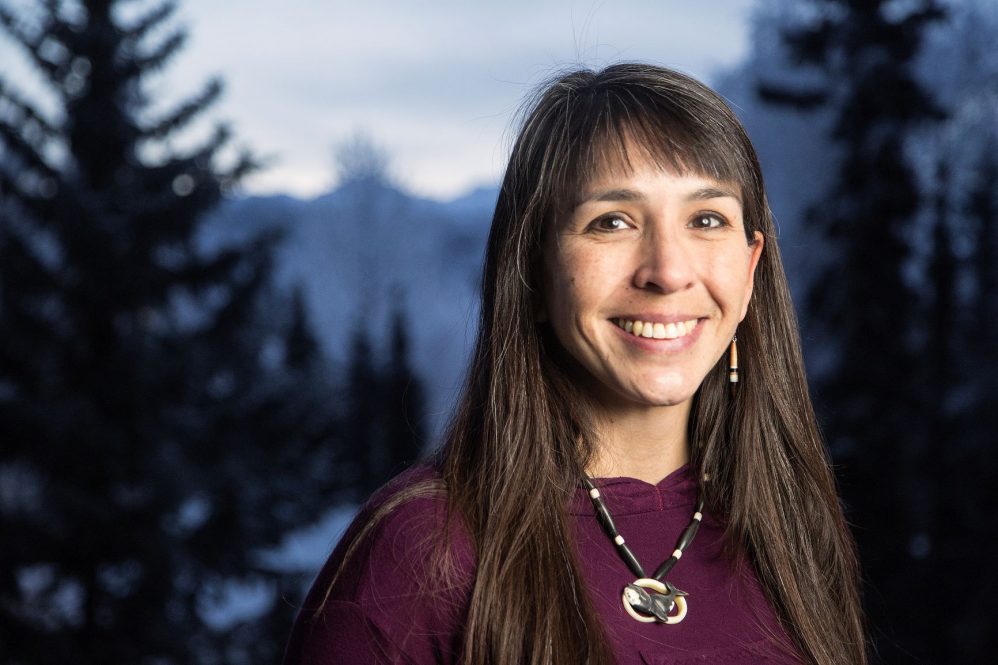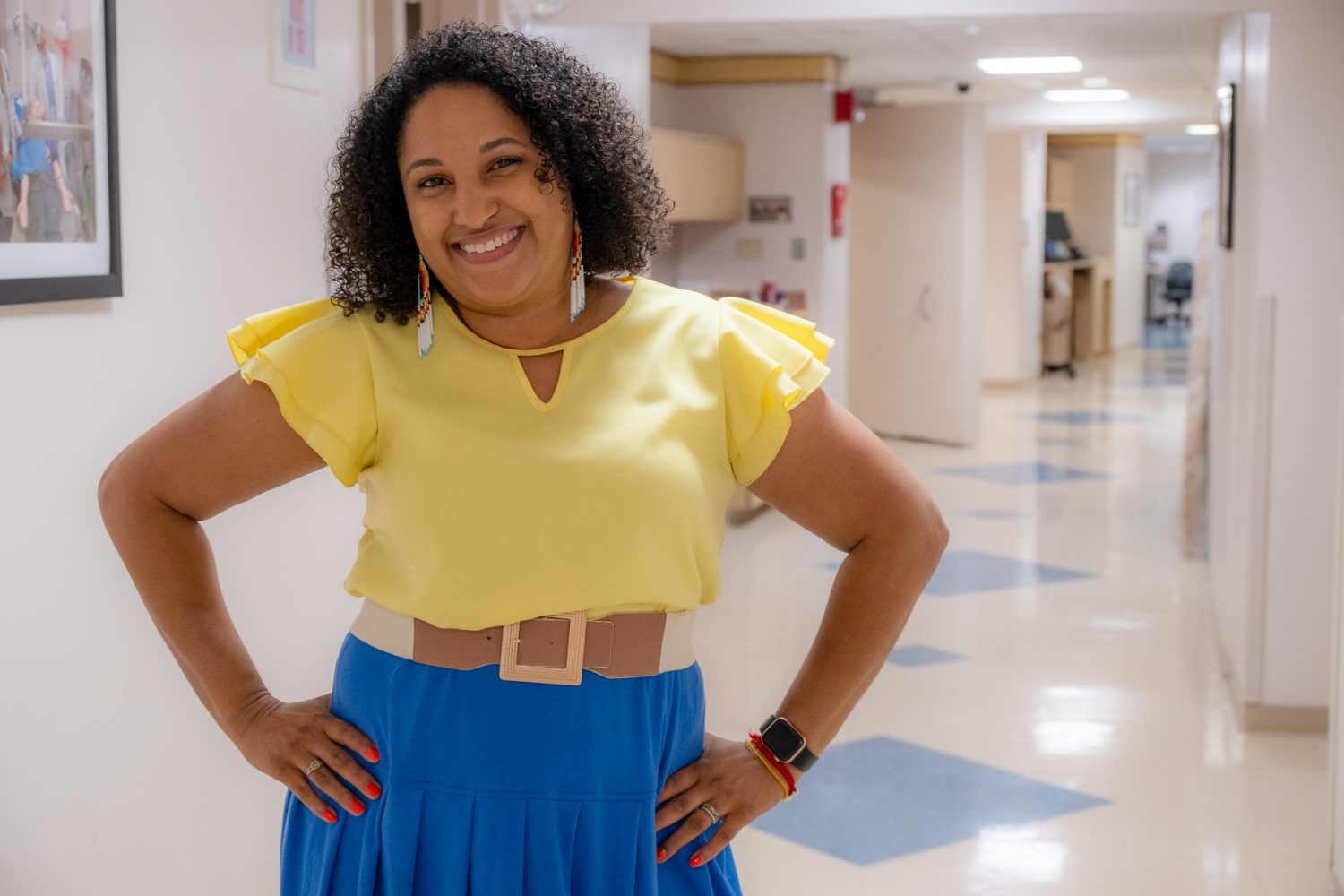Growing up Kotzebue, Alaska, a small town 33 miles north of the Arctic Circle, UConn assistant professor of microbiology Kathryn Milligan-McClellan aspired to become a doctor. Her patients would be Alaskan Natives like her, and she would treat them with more respect than they had traditionally been afforded by the local healthcare system.
Milligan-McClellan ended up earning a Ph.D. – the first Native graduate of the Microbiology Doctoral Training Program at the University of Wisconsin at Madison to do so – but her commitment to serving Indigenous communities and other historically excluded and underrepresented (HEU) people never wavered.

Throughout her career in academia, Milligan-McClellan has intertwined her scientific pursuits with her work to lift Native and HEU students and faculty, an approach shaped by her experiences growing up and her own educational journey. Her melding of the two was recognized in spectacular fashion in October, when Milligan-McClellan received a $1.15 million Chan Zuckerberg Initiative Science Diversity Leadership Award. The funding aims to acknowledge and advance the leadership of excellent biomedical researchers who — through their outreach, mentoring, teaching, and leadership — have a record of promoting diversity, equity and inclusion in their scientific fields.
“I was shocked,” she says of winning. “The acceptance rate is about 6% among qualified applicants. It is very competitive and the people who didn’t get it are amazing researchers and well deserving.”
Milligan-McClellan’s advocacy and inclusion efforts date back to graduate school, where she was active in campus Native student organizations. During her postdoctoral training at the University of Oregon, Milligan-McClellan helped start and run a Native Strategies group working to open dialogue between the University of Oregon President and Oregon tribal leaders to ensure the Longhouse – a gathering place for Native groups on campus – was maintained under a tribal liaison. Upon leaving the university, the head of the Longhouse and Native students and faculty recognized her work with a blanketing ceremony that she calls one of most meaningful honors of her career.
Since arriving at UConn in 2020, Milligan-McClellan has participated in anti-racist and Native panels, hired mentees from excluded and underrepresented backgrounds, and supported Native faculty. She is also involved with the Native American and Indigenous Studies program, co-advised the Native American and Indigenous Student Association (NAISA), and, alongside Sandy Grande and the other NAIS faculty, the Native American Cultural Program (NCAP).
Milligan-McClellan developed and teaches a science writing class that highlights the accomplishments of HEU scientists and the obstacles they have had to overcome to achieve them. She continues to support Alaska Native students as a mentor and board member of the Caleb Scholars Program (CSP), which seeks to train and support Alaska Native students dedicated to preserving Alaska Native subsistence living, traditional lifestyle, and preserving Native lands and water while earning a college education.
The five-year grant funding will allow her to pursue research inspired by health disparities among Alaskan Natives, who have a higher incidence of diseases connected to changes in the microbiome, Milligan-McClellan says. The project will explore why the microbiota, which affects inflammation, is different over time and across populations.
Milligan-McClellan will use populations of stickleback fish to identify potential factors influencing interactions between host and microbe in adults. Like humans, stickleback fish have extensive ancestral and environmental diversity between populations and can be studied in the lab and the wild. Her research will consider extrinsic, or outside, factors influencing the host such as stress, environment, diet or exposure to new microbes as well as intrinsic, or within the host, such as ancestral history, immune system, and depletion of ancestral microbes.
Milligan-McClellan says pursuing her own career opened her eyes to the importance of supporting Native and HEU students, and increasing the numbers, and perspectives of Native researchers. As an undergraduate at Wisconsin – one of only 250 Native students in a student body of 40,000 –she remembers the loneliness she felt and how much she missed sharing traditional foods and having someone to talk to about Native issues.
“Although I did my best to assimilate into the 80 percent white student population, I was reminded again and again that I was different,” she says.
Over time, Milligan-McClellan stopped trying to fit in and embraced her Inupiaq identity, she said. In her application for the award, she describes the thrill of seeing a student from her hometown while teaching an Introduction to Microbiology class in her first tenure-track position at the University of Alaska, Anchorage.
“I felt our ancestors in that room, guiding her as she studied to become a health care worker and me as I figured out how to integrate and weave together my Inupiaq knowledge and microbiology education into undergraduate level classes.”
Milligan-McClellan went on to mentor five Native students in the five years she taught at Alaska-Anchorage, more than any other faculty member in her department. In the years since, she has given numerous talks about her educational experience, published work on mentoring HEU scientists and creating inclusive spaces in STEM for both students and faculty. The funding from the grant will help Milligan-McClellan conduct panels and workshops focused on developing, recruiting, and retaining HEU scientists. Activities will include discussions on advising Natives new to STEM, career and research discussions with LSAMP and career development panels at assorted conferences.
“Through these efforts, my hope is that the next generation will persist and thrive in a system not built for them originally, but which now welcomes them and encourages them to weave together their Indigenous and academic knowledge to advance their fields.”



